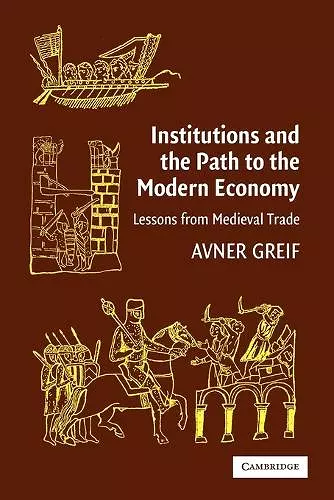Institutions and the Path to the Modern Economy
Lessons from Medieval Trade
Format:Paperback
Publisher:Cambridge University Press
Published:16th Jan '06
Should be back in stock very soon
This paperback is available in another edition too:
- Hardback£95.00(9780521480444)

This 2006 book presents a unifying concept of the term institution.
It is widely believed that current disparities in economic, political, and social outcomes reflect distinct institutions. Institutions are invoked to explain why some countries are rich and others poor, some democratic and others dictatorial. But arguments of this sort gloss over the question of what institutions are. This book was first published in 2006.It is widely believed that current disparities in economic, political, and social outcomes reflect distinct institutions. Institutions are invoked to explain why some countries are rich and others poor, some democratic and others dictatorial. But arguments of this sort gloss over the question of what institutions are, how they come about, and why they persist. They also fail to explain why institutions are influenced by the past, why it is that they can sometimes change, why they differ so much from society to society, and why it is hard to study them empirically and devise a policy aimed at altering them. This 2006 book seeks to overcome these problems, which have exercised economists, sociologists, political scientists, and a host of other researchers who use the social sciences to study history, law, and business administration. It presents a multi-disciplinary perspective to study endogenous institutions and their dynamics.
'Greif strips economic transactions down to their elements. He focuses on the core question: who (or what) were the watchdogs that allowed the merchants to trust one another and to bear with the princes who could confiscate the fruits of all their efforts? And who (or what) were the watchdogs' watchdogs? Greif repeatedly and carefully relates these questions to economic theory. He illustrates them with real transactions of medieval merchants. He takes the right approach to economic development, and thereby achieves an original and important new perspective on its causes. Institutions and the Path to the Modern Economy is a seminal work in economics and in history. It should be read by all social scientists.' George A. Akerlof, 2001 Nobel Laureate in Economics and University of California, Berkeley
'If economic theory is worth anything at all, it should illuminate economic history. The most usual attempts to interpret history in terms of mainstream economic theory have tended to leave out the specifics and, in particular, the influence of past events and structures on later ones. Avner Greif's work demonstrates the power of using economic theory, especially game theory, to illuminate both structural patterns and change, while still respecting historical specificity. The evolution of medieval trade is used as a case to show how the problems raised by economic theorists (e.g., the need for enforcement of contracts ) are resolved by the creation of institutions which are constrained to be self-enforcing equilibria. I believe Greif's approach will lead to a revolution in the study of other eras and even the changes in present regimes.' Kenneth Arrow, 1972 Nobel Laureate in Economics, and Professor Emeritus, Stanford University
'In Institutions and the Path to the Modern Economy, Avner Greif explores the cultures that prevailed in the European and Islamic portions of the Mediterranean in the Medieval period and the implication of their differences for the modern world. To tackle so grand a theme, Greif rearranges the intellectual furniture. Embedding game theory within the behavioral sciences, blurring the boundaries between deductive reasoning and empirical research and qualitative and quantitative methods, Greif teaches us not only about history but also about the place of history in causal explanation. Greif's book will shape future work in history, the study of development, and the social sciences.' Robert H. Bates, Harvard University
'Avner Greif's study is a major landmark on the road to increasing our understanding of institutions and the role that they play in economic performance.' Douglass C. North, 1993 Nobel Laureate in Economics
- Winner of AFEE-EAEPE Veblen Prize 2007
ISBN: 9780521671347
Dimensions: 229mm x 152mm x 30mm
Weight: 698g
526 pages